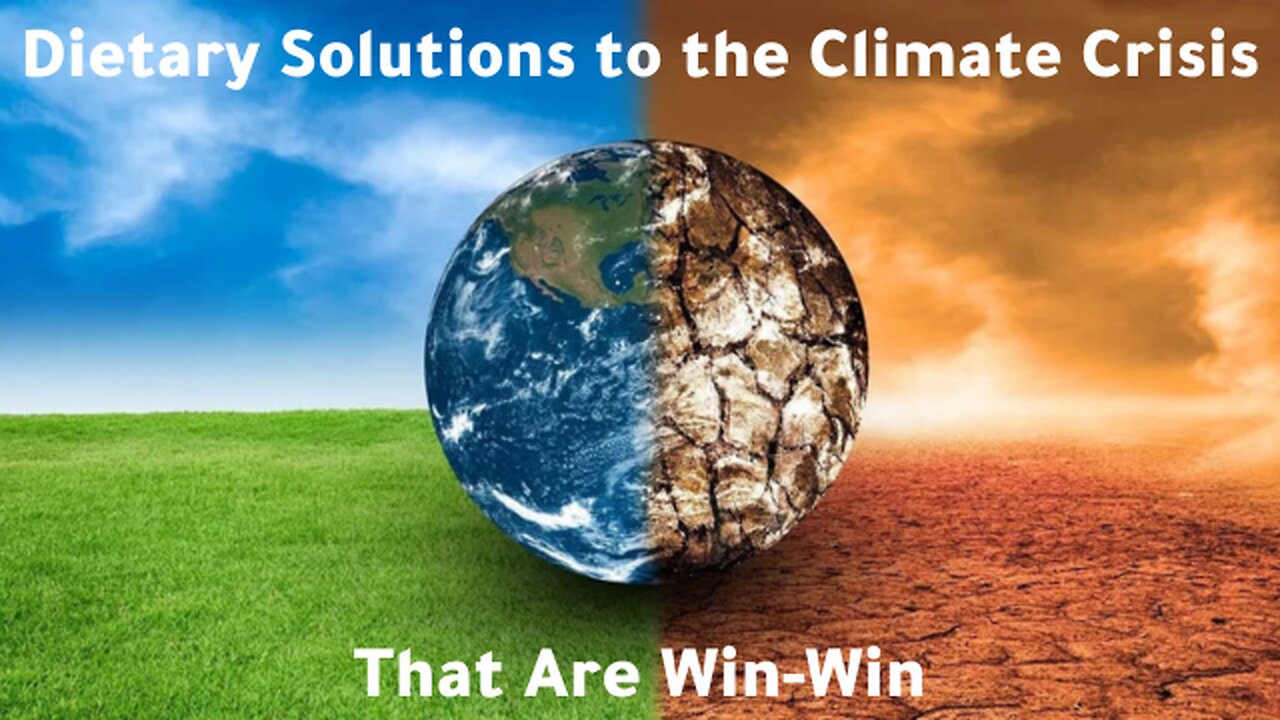Premium Only Content

Dietary Solutions to the Climate Crisis That Are Win-Win
Scientists have a clear moral obligation to clearly warn humanity of any catastrophic threat and to tell it like it is in November 2019, more than 11.
1000 scientists from 150 countries clearly and unequivocally declared that planet Earth is facing a climate emergency. CO2 levels are rising, the glaciers are melting, Antarctica is melting, the Ocean's getting hotter, more acidic, sea levels are rising, and so are extreme weather events. And yes, yeah, fossil fuel use is going up, like air travel, but so is per capita meat consumption.
In fact, one of the solutions they offer to help the climate crisis is eating mostly plant based foods while reducing the global consumption of animal products. And what makes designing a sustainable diet so easy is that the same advice like eat less meat is good for both personal health, like reducing the risk of our number one killer, as well As for planetary health right the least healthy foods.
Also caused the worst environmental impact. The foods with the most nutrition just so happen to be the foods that caused the lowest greenhouse gas emissions. So you get this win win effect. So let's put it all together. We are to redesign the global food system for human and planetary health, which is to say human health and future human health. What would it look like? Enter.
The East Lancet Commission, the result of more than two years of collaboration between 37 experts from 16 countries suggesting a cut in total meat consumption down to like an ounce a day. It's like the weight of a single chicken nugget, right? All the while dramatically increasing or intakes of legumes, which are beans, split piece, chick peas and lentils, nuts, fruits and vegetables.
Because we're not just in our climate crisis, but a health crisis, right? Unhealthy diets cause more death and disease than smoking, more than unsafe sex and alcohol, drug and tobacco use combined. But we can address both crises at the same time by increasing our consumption of whole plant foods and substantially reducing our consumption of animal source foods. Eating such a diet could save the lives of more than 10.
Million people a year and may just help save the world. The Paris Agreement had set out a boundary condition. An aspirational goal for a carbon budget to help prevent catastrophic impacts and staying within the boundary for climate change can be achieved by consuming plantbased diets.
And the personal benefits may be comparable with or even exceed the value of the environmental benefits. The healthcare benefits alone for a healthy global diet, predominately plant based diet, vegetarian or a vegan diet could exceed the price of the carbon saved. We're talking up to $30 trillion a year saved from the health benefits alone.
Now, if the health of yourself, the planet, and your own children doesn't quite motivate you, consider that you may also be facing threats to the global beer supply. And healthy diets don't just reduce greenhouse gas emissions. Since livestock production is the single largest driver of habitat loss, reducing meat consumption is also the key to biodiversity conservation.
Ideally perhaps, reducing demand for animalbased foods by increasing the proportion of plantbased foods up to like 90% of the diet. Livestock production is also a leading cause of a soil loss, water and nutrient pollution. Yet it appears to be a blind spot in water policy. Despite the fact that animal products form the single most important factor in humanity's water footprint, water managers never seem to talk about meat and dairy. But it's not just animal products. I mean, yes at least.
80% of the deforestation in the Amazon is to raise cattle and grow feed crops like soybeans to export to other farm animals, but also to make vegetable oil, most of which is from palm and soy. Both crops have been expanding, resulting in massive deforestation. It just seems kind of particularly egregious if that deforestation takes place for the sake of junk food.
Not everyone agrees we should be moving to healthier diets though. The World Health Organization actually pulled out of the E Atlantic Commission because of their promotion of a global move to more plant based foods. See, if we focused on promoting predominant plant based foods and excluding foods deemed unhealthy, including meat and other animal based foods, such a diet could.
Yeah, save 10 million lives a year, $30 trillion, and help save the entire planet. But could lead to the loss of jobs linked to animal husbandry and the production of junk.
-
 LIVE
LIVE
G2G Gaming Channel
2 hours agoMonday Smite Fix! #RumbleTakeOver #RumbleGaming
397 watching -
 LIVE
LIVE
Jeff Ahern
1 hour agoMonday Madness with Jeff Ahern (6am Pacific)
683 watching -
 LIVE
LIVE
PudgeTV
13 hours ago🔵Vigilante Nights - Batman: Arkham Origins | Live Playthrough Pt. 5
133 watching -
 15:21
15:21
Degenerate Jay
16 hours ago $7.55 earnedThe Mystery Of Silent Hill 2's Strange Photos Has Finally Been Solved
36.4K9 -
 9:47
9:47
Cooking with Gruel
19 hours agoMastering Potato Gratin
20.7K27 -
 8:34
8:34
GBGunsRumble
14 hours agoGBGuns Range Report 24NOV24
15.4K4 -
 2:04:09
2:04:09
Nerdrotic
14 hours ago $87.98 earnedNew Peruvian Megalithic Site Discovery w/ Michael Collins | Forbidden Frontier #083
184K22 -
 6:40:53
6:40:53
Fresh and Fit
15 hours agoMyron TRIGGERED Rubi Rose, And Debating Cry Baby Blax On X Spaces!
180K129 -
 4:54:16
4:54:16
TheSaf3Hav3n
13 hours ago $29.81 earnedCALL OF DUTY: BLACK OPS 6 | A QUIET PLACE: THE ROAD AHEAD | #RumbleTakeOver
94.1K6 -
 4:05:35
4:05:35
TheNateVibez
13 hours agoOmni-🤖 - First Rumble Stream.🫡 - VETERAN
80K4